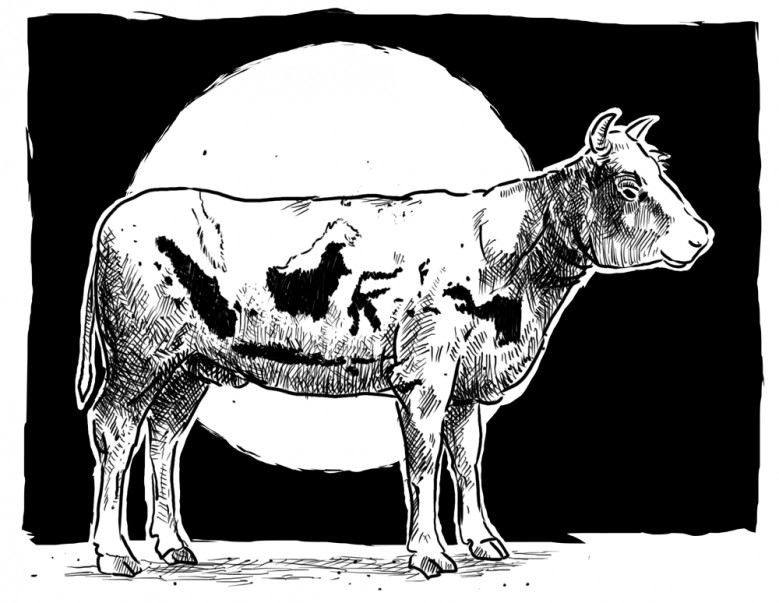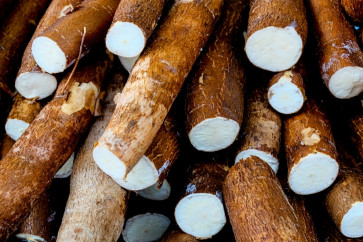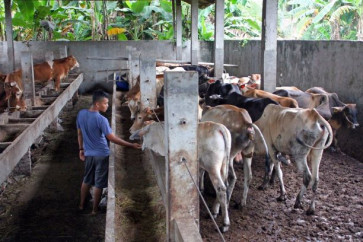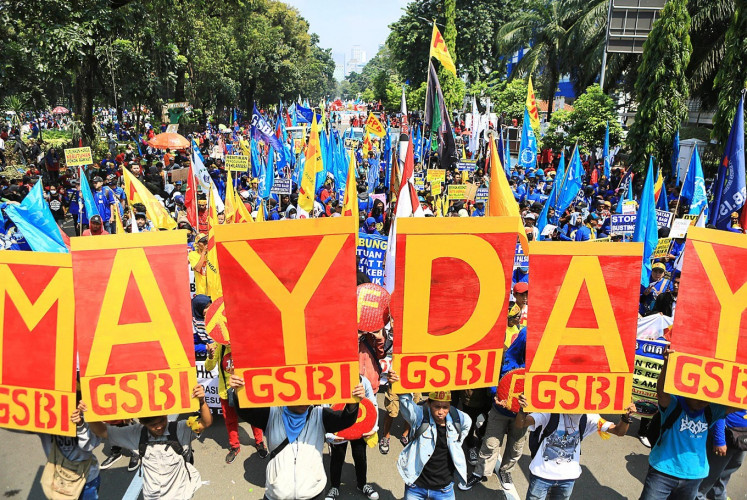Performing ‘qurban’ during Idul Adha 2021: Know and mitigate the risks
Applying strict health and hygiene protocols during the ritual sacrifice of animals for Idul Adha, as well as following sharia, is more important than ever this year, as is the significance of the religious holiday.
Change text size
Gift Premium Articles
to Anyone

Q
urban (ritual animal sacrifice) to commemorate Idul Adha, which falls on July 19 to 20, will be more important than ever for Muslims around the world this year, as Saudi Arabia has limited the annual haj to allow just 60,000 local worshipers to prevent the spread of COVID-19. Hence, there is most likely to be an increase in qurban to compensate for the haj among those pilgrims who have had to cancel their trips this year.
Furthermore, many Muslim-majority countries are experiencing a second wave of COVID-19 infections. The practice of qurban should therefore be performed with extra care in accordance with the health protocols. On the other hand, observing qurban is a relevant solution to moderating the current economic malaise, curbing inequality and alleviating poverty.
Qurban is an Islamic tradition that recalls the Prophet Ibrahim’s unwavering faith in God, and is essentially a religious practice that encourages the wealthy to sacrifice an animal in the name of God. The meat from the sacrifice is then distributed to the poor and needy. The chapter of Al Kauthar (abundant good) in the Quran states: “So pray to your Lord and sacrifice [to Him alone].”
In this act of worship exists a parallel between the spiritual relationship to God and secular ties to society. Qurban emphasizes one’s faith through recognizing and respecting people in the community.
Further, the Prophet Muhammad (peace be upon him) emphasized the urgency of qurban, saying that a reward was contained in each thread of hair of the animal that was sacrificed in God’s name. Elsewhere, he forbade anyone to approach a mosque if they had financial leeway but did not offer a sacrifice. This shows that neglecting respect and help for society means that they do not know their God and have not received God’s blessing.
In terms of value, qurban has tremendous potential for boosting the economy. Research by the Institute for Demographic and Poverty Studies (IDEAS) estimated that the economic value of qurban reached Rp 20.5 trillion (US$1.4 billion) in 2020 and involved around 2.3 million middle-class Indonesian Muslim families. Meanwhile, the Agriculture Ministry estimated that 1.8 million livestock were slaughtered for the Day of Sacrifice last year.
The pandemic has shifted the behavior of Muslims in practicing qurban. First, many Muslims now prefer purchasing qurban animals online. The transactions are made through e-commerce platforms and other websites that cooperate with zakat or philanthropic organizations that provide qurban services.
Second, there is a growing trend in performing qurban for the poor in rural and remote areas. In these cases, the shohibul qurban (qurban customers) order the livestock online with the request that the qurban service providers perform the sacrifice in areas where people need them the most. The providers then purchase the ordered livestock from local farmers, perform the qurban and distribute the meat to the local poor.
This practice allows for the economy to flow from urban to rural areas and for smallholder livestock farmers to enjoy economic incentives during this annual holiday. It is very relevant in the current situation, wherein many predominantly Muslim countries banned mudik (exodus) during Idul Fitri to avoid spreading COVID-19.
Qurban also improves per capita meat consumption, especially among the poor. According to the Organisation for Economic Co-operation and Development (OECD), the global average per capita consumption of beef and sheep meat are respectively 6.39 kilograms and 1.76 kg.
Indonesia’s per capita beef and sheep meat consumption stand at a mere 2.17 kg and 0.42 kg, respectively.
One might doubt that the qurban, which the Religious Affairs Ministry is limiting to three days this year, could reduce economic inequality or significantly improve nutritional intake.
But it is the awareness of these issues that has brought about the third shift in consumer behavior, in that many Muslims are now channeling their zakat, infaq (voluntary donation) and waqf (religious endowment) to philanthropic organizations that are empowering livestock farmers and breeders by creating rural training and development centers.
Each center structures the use of alms and donations to provide technical training, immersive mentorship and consultation for farmers and breeders. The centers also provide funds for eligible recipients to develop their farms.
In addition, these centers advocate for farmers so they obtain the best fodder seeds to improve the quality of local livestock breeds. Outside the qurban season, the farmers can still earn money from trading livestock and other derivative businesses such as compost, leather and food production.
Many zakat institutions in Indonesia now employ this empowerment model to run long-term poverty eradication programs, especially in rural areas.
There are several risks that qurban service providers must mitigate amid the pandemic.
First and foremost is the health risk related to preventing coronavirus transmission, quality of meat and animal welfare. If possible, the qurban should be performed at a halal-certified slaughterhouse. If not, it should be performed in a restricted area to avoid mass gatherings. Furthermore, the meat should be handled well and distributed directly to avoid quality degradation.
Second is the operational risk consisting of two main concerns, namely human resources and technology. Those performing qurban must have sufficient knowledge of slaughtering, the health protocols and sharia regulations related to qurban. Capacity building and adequate equipment support are necessary to reduce the operational risk. In addition, qurban service providers must upgrade their IT systems so their platforms can facilitate easy, convenient and transparent online transactions.
Third is the market risk, which concerns the potential price hike as the number of available livestock diminishes over time. The philanthropic organizations providin qurban services should mitigate this risk by arranging a robust livestock supply chain. The rural livestock empowerment centers could help these organizations to address this risk.
Fourth is the sharia risk, which relates to Islamic law on qurban. Qurban has a time constraint and performing it is only valid between the 10th and 13th days of Dzulhijjah. Sharia also regulates the suitability of livestock for qurban, such as age and physical condition. The slaughterer must also be a Muslim with adequate skills and knowledge in halal slaughtering.
Finally, qurban is relevant and pertinent in overturning the economic doldrums of this pandemic. In order to reap all the benefits of qurban, complying with the health protocols is imperative.
***
The writer is a graduate academic assistant at the International Centre for Education in Islamic Finance (INCEIF) in Kuala Lumpur, has a master of Islamic finance and management from Durham University and is a former head of zakat use at the National Alms Agency (Baznas), Jakarta.









